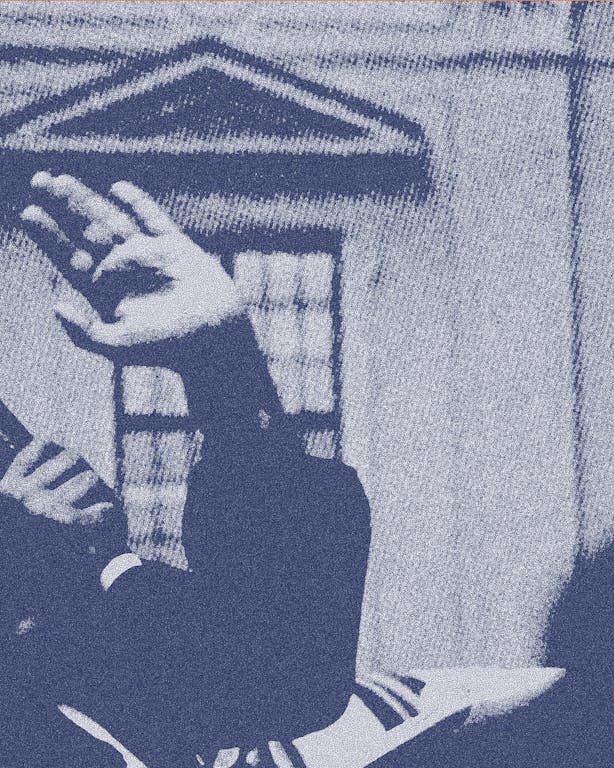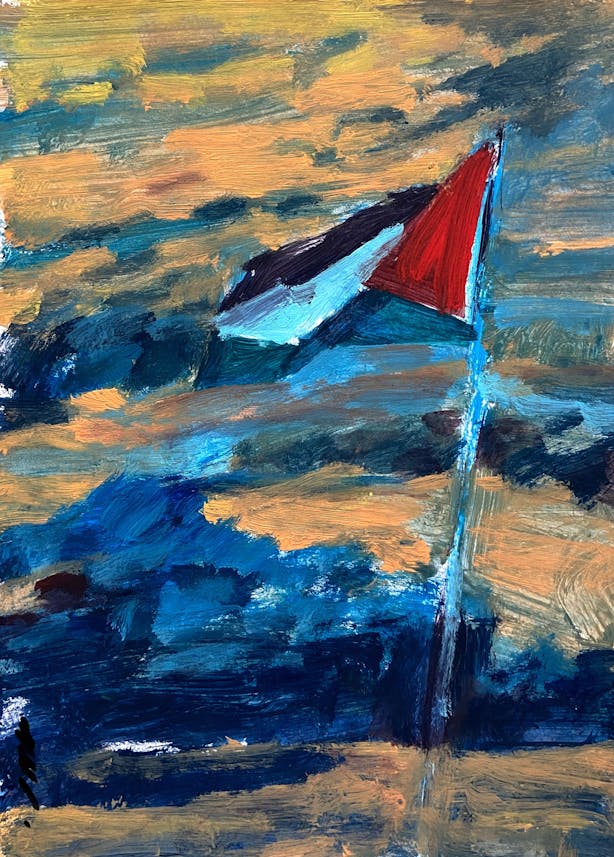
- Mission Statement
1. The Anti-Imperial Core: We Were Never Postcolonial
Stephanie Bailey, Radha D’Souza, Adam Broomberg, Françoise Vergès, Anjalika Sagar, Nour Yakoub, Gaurav Sinha
Mission Statement 00: Why Now?
This is a lightly edited transcript of Francesca Albanese’s opening keynote from Ibraaz Mission Gathering 00: Why Now? which took place on 21–22 February 2025.
Speaker: Francesca Albanese
Respondent: Nadja Argyropoulou
Francesca Albanese: I wish to express my gratitude to the Ibraaz team for inviting me. I would have been very happy to be with you, but as you might have seen from the news, I am coming from two intense weeks in northern Europe, and I needed to come back to the comfort of Tunis.
At this point in time, I really fear for where the legal order currently is. It stands at the edge of a precipice. I’m not trying to be dramatic, but this is the situation we find ourselves. And Palestine and Israel lie at the centre of this collapse, both as a cause and as a consequence. We live in a world where the discussion, the political discourse, is more centred on or leaning towards security, and I keep asking: security for whom? The security of all people? All of us? Or just a select few? Is it the security of all states or just some states in particular, and their political and financial interests?
Palestine is a case in point. Security has been used to justify the intentional, progressive, and incremental destruction of a people as a whole. Security for one group at the expense of the other. And in this context, peace has become a meaningless word that has been used to justify, cover up, and not see this low-intensity ethnic cleansing, annexation, apartheid, and racial discrimination. Israel’s policies have brutally accelerated over the past 16 months, and will not stop unless stopped; unless someone intervenes and puts an end to it. I do not see right now the political conditions for that to be possible, so it’s upon us in each country to create those political conditions that do not exist. The power is still with the people, and this is something that we seem to have forgotten as a society. Especially in the West, I see a sense of self-defeatism that is unjustified because we still have privilege. If we can go out and protest, it means that we can. We need to use that collective space to hold powers, including political and financial leaders, accountable. This is the challenge we have today and it’s not new. What we are experiencing is part and parcel of European identity, and this is where I think the connection between the past and the future is evident. In the past decade, imperialism has become exposed as it never has been.
What has happened in the Occupied Palestinian Territories should have raised the alarm and raised more than international condemnation. Instead, what is happening? It has barely registered with our political representatives, and this is because of the dominant strategy that has been proposed to discuss the future of Palestine through peace. Framing it as a problem of economic development or assuaging the most critical wounds through humanitarianism in perpetuity, shows the limitation of the system that was created 80 years ago, when the United Nations was created. International law was the normative framework that the system gave itself, and it enriched itself with human rights. I insist that human rights were not a concession made from imperial power to its collective citizens – it is something that the human rights movement has fought for and we have forgotten the way. These days, I often remind people, especially in the part of the world where I come from in Europe, which includes many of you in the UK, that it’s not the case that it is only in that part of the world that a movement against apartheid started. In other parts of the world, people have been fighting for their recognition, like the Civil Rights movement to end racial segregation in the United States. How many fights, all over the world, have Indigenous people had, or women, or other people whom today we would call LGBTQ+? We continue to struggle for our human rights. It’s a never-ending story. It’s a never-ending chapter of the story of humanity.
My generation in particular, and the generation that preceded it, has been sitting idle thinking that this system of human rights would last forever. But this is clearly not the case. Rights are being threatened. Look at forms of expression, freedom of opinion that are criticised, the right to scrutinise the government, to say this is not new because this is what imperialism is about: the control over land and resources, and annihilating, if necessary, the people to whom it should belong. This is the ultimate truth about imperialism, as the intellectual giant Edward Said used to remind us, which is found in settler colonialism. It’s oppression; the denial of indigenous claims. That is still the battle. It’s not that imperialism has come back. Imperialism has never disappeared. It has become more vicious because it has armed itself with other tools. Its methods of control are fragmented, but its very nature has remained the same.
This is about a power of a minority or a group that continues to survive by trying to control, dominate, and exploit the Other. This is imperialism and imperialism flows in one direction from the Empire toward its imperial subjects. We are not part of the Empire as citizens. We are part of the Empire as subjects. As such, we only have rights that reach us as concessions. We cannot really activate our claims. This is the reality in which we live and it’s more and more evident that imperialism is on the resurgence. It’s more dangerous than a century and a half ago, because today, not only has imperialism armed itself with the control of resources through capitalism, but it has also weaponised itself. The highest concentration of weapons today exists in the hands of the Empire, but it’s also very clear that the heart of the Empire does not just include Europe anymore.
Where do we stand in the face of this? I think in two possible directions, and I don’t mean to oversimplify. But it’s the job of ordinary people, civil society, intellectuals, anyone from any walk of life, to understand where we are in this world, and what kind of leverage we have to influence the space where we live in. We still have the capacity to influence policy making in our own countries. And to you in the UK, the power dynamics and the reason why it has not happened so far, despite all the mobilisation, is that it has not been disruptive enough. We still have the possibility to make the difference, and the first thing we need to have is clarity. We need to see and understand the system we are dealing with, because if we don’t see it, it’s very hard to try to change it. It’s a matter of educating ourselves and educating others. The system has made us all more vulnerable and fragile. Workers are less protected than before. This reflects how, in the past 20 to 30 years, there has been a continuous decline, because having fragile individuals as part of society makes society less prone to effective reaction against the system at the national and international level.
Palestine today is the litmus test for our democracies, for our capacity to uphold basic principles of humanity, but also international law. I keep on saying to people in the UK, as in my own country, that our states have enabled – politically, financially, militarily – what has happened to the Palestinians. The crimes that Israel has committed against the Palestinians wouldn’t have happened, couldn’t have happened, without the active financial, political, economic, and military support that has come from our governments and our societies. This is another aspect of the Empire that needs to be clearer. The Empire lives by exploiting people, but also by creating an interdependence around this exploitation. Our work and our land is also contributing to the exploitation of Palestinian life and land. If you look at the research institutes or economic trade, you can immediately see how much of what we do also contributes to Israel’s system of racial segregation and apartheid. We need to break this. But in order to break it, we need to see it. We still have the capacity to initiate strategic litigation and to mobilise in a more disruptive way. I’m not inciting, of course, anyone to commit violence, but demonstrations have to disrupt some functions of imperial power, otherwise it won’t work. This is what strikes are about. This is what we learn from other liberation movements. Of course it’s not going to be easy. But nothing of what lies ahead is going to be easy or particularly pleasant. But we need to understand that what the Palestinians have experienced is not something that will stay in Palestine, because the interconnectedness of the various parts of the Empire is going to turn against us as well.
Germany, where I just came from, is an example, with its repression and infringement against individuals, against anyone, who stands in solidarity with the Palestinians. It doesn’t matter that it’s Palestine, or what the trigger is. It could be any cause. The repression I’ve seen during my visit has shed light on that: this is something that is already beyond normal and what has happened in Germany can happen everywhere. I think it’s already happening in the UK, where I could have never imagined years ago that I would one day see the anti-terrorism law employed against journalists, the truth tellers. This should scare the hell out of everyone in the UK, and the fact that society as a whole does not react is a symptom of the disease that has affected us, and it also means more work for you; for those who see what’s happening and need to continue to sound the alarm and try to organise and strategise how to fight the system from within.
I will stop here to give some time to the floor, if there are questions.
Nadja Argyropoulou: What would the role of law-making and law-implementing be in this kind of crisis? We see how the ICC warrant against Netanyahu is not going to be implemented. And while we think we now need lawyers, judges, the law of rights being next to what we do, there is still the harsh reality of this not being enough or not working as it should.
Francesca Albanese: First of all, I think we need to take a step back from the current moment because I know that it seems the most horrible moment in human history, but it’s not the case. The system, I mean, the international order for the past 500 years, has been dominated by imperialism and imperialism has changed, has been challenged, has weakened, but it is still there. Even the last eight years have been, probably, one of the bests times for humanity, because after the Second World War there has been less war. Life expectancy has increased, so collectively, we have done somewhat better. Yet, as at every turn of history, now we are confronted with another challenge, and we need to push in order to meet that challenge. What we have is a system that will not correct itself from within. This is why I insist that we need to have multiple strategies. This is not something that is going to be won through one strategy or one fight, because at the moment the law that is there to protect us is being violated by the very power which should apply that law. And this is the second point. We don’t only have the law, we have law enforcement. It’s not the law that is fallacious. It’s the system that doesn’t abide. The third level is the court system. If the court system doesn’t even work, this is of course not possible – and again, I am coming from Germany where I’ve given evidence on how much the court system has not met expectations in terms of compliance with international law. But I also understand that in the UK the situation is different, so this is why litigation is important here. But also, the kind of challenges we are facing require a strategy that cannot just be advanced in the courts. I have to say, I don’t want to sound revolutionary, that society as a whole needs to raise its head above the parapet because everything is on the line and it cannot be left to the students or the protesters in the streets. Society as a whole needs to react. Where are the intellectuals? Where are the journalists? Where are the doctors? I know that a few have spoken out. Many more need to join. This is not just about what’s happening in the Middle East. It’s the role that the UK plays in the global scene, but also how it reacts against its citizens.
The second part of the answer I wanted to give was about the international justice system, which has been forced to move in the last two years, and incredibly so, because no one could have ever imagined Israeli leaders being indicted. It should have happened before, but it did not. But now the justice system has shifted. So in response, parts of the Empire push back and say: ‘It won’t happen. We won't arrest him.’ This is very dangerous because it’s taking away from the victims the last resort that they have to justice. If nothing works, I’m really afraid that there will be more violence. So we need to make the system work. And another option that needs to be understood in order to hold the government and its various bodies and individuals accountable: think of the International Court of Justice Advisory opinion of 22 July 2024. This is so radical, so important, such as a landslide in terms of understanding the illegality of Israel's endeavour in the occupied Palestinian territory. This should have been used and must be used more. And I encourage all of you to read it, and if you don’t want to read the decision itself, there are many summaries in the UK. There is Professor Ralph Wild, who has analysed it and made it very simple. We need to understand what it is, because the illegality of the occupation is such that it concerns every manifestation. It concerns the military presence, the settlements. It concerns any control that Israel maintains in the occupied Palestinian territories, and therefore anyone, any university, who maintains partnership with Israel as long as it maintains the illegality of the occupation and any other ties. As I said, economic, financial ties have to be curtailed by the state and any private actor. So again, this is why I say there is the court, but there is also public opinion, and public opinion is something that has an effect on businesses – I mean here as well as, or even more than, the lengthy process of accountability through the judicial system. This is why I say that today, we have to arm ourselves with full knowledge of the facts and full knowledge of their legal components. This is not as complicated as it might sound. As long as Israel maintains the occupation in the West Bank, the Gaza Strip, and East Jerusalem, there is no way that any interaction with the state of Israel is complying with international law. If it risks being detrimental to the Palestinians, it must be suspended. It must be curtailed. This is where the system, the remnants of the Empire that clearly operates in the UK as well, is slow to react. But we also don’t see how much this is dragging Europeans toward the precipice, because we have nothing to gain from it. That is more than clear now.

Stephanie Bailey, Radha D’Souza, Adam Broomberg, Françoise Vergès, Anjalika Sagar, Nour Yakoub, Gaurav Sinha

Omar Berrada & Shivangi Mariam Raj

Ahmed Alnaouq, Tareq Baconi, Fatima Bhutto, Sonia Faleiro, and Ahmed Masoud